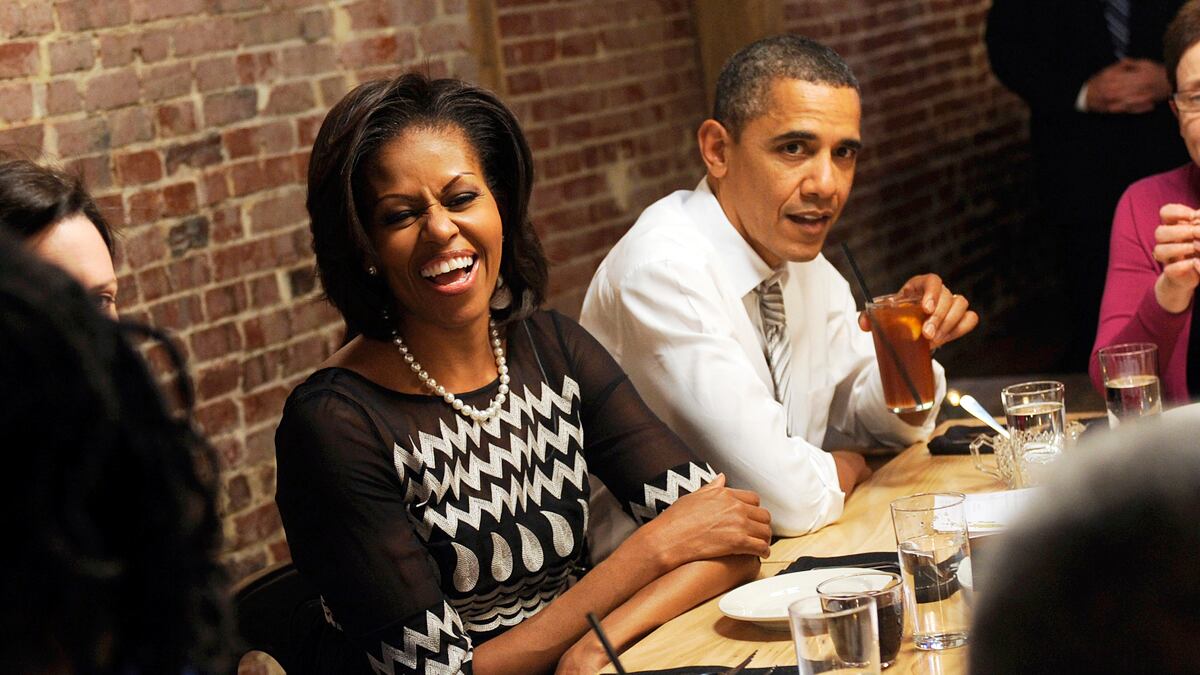I got an email from Barack Obama! Oh wait, you did too?

Politicians emailing for dollars is nothing new, and since 2008 Obama has built a massive database of information on millions of supporters and potential supporters that has been seen as an ace in the hole as he gears up for his last run. Past raising money, the list gives the president a direct line to supporters, who regularly receive messages intended to feel as if the administration is talking directly to them. But it’s not clear that personal touch is connecting.
In the lead-up to big events, like filing deadlines, the Obama campaign ups the pace of its emails in the voice of the president, often asking supporters to join the fight with their purses. The missives come with casual subject lines that mimic what a real friend might send, like “Hey.” His language inside is genial and relaxed. “If you’re with me, let me know,” says the leader of the free world, who signs off: “Talk to you soon, Barack.”
Most notes are relatively short, and call for concrete actions like donating money or taking a survey that create opportunities for the campaign to track responses, learn more about the people responding and follow up with them. But those alternate with longer missives from Barack, and the rest of the gang, including Joe, Michelle, and the two Davids. The campaign won’t reveal much about the size of its recipient list or their process for deciding which list members receive which emails, but manufacturing authenticity is key.
“In terms of senders, we try to write as closely as we can in the actual voice of the actual person. If it doesn’t sound like Julianna, that’s not where we want to be,” said Obama for America’s digital communications manager, Teddy Goff, referring to deputy campaign manager Julianna Smoot. The emails, he said, are crafted by a staff collective, and exactly who writes, vets, and signs off on them is purposely obscured from public view, so the only known voice is that of the purported sender.
A rudimentary count of one reporter’s inbox found 14 different senders in recent months, though since different people receive different emails there may be more senders. Andrew Rasiej, the founder of Personal Democracy Media and Tech President, says this strategy is meant to alleviate recipients’ sense of overkill.
“If I get a note from Obama everyday, I’m going to think it’s spam,” said Rasiej, who advised the Clintons on new-media strategy in the late ‘90s. Different senders, he says, give the illusion of intimacy and tailored interests and asks. “It’s a psychological trick.”
When Wendi Smith learned she’d be having dinner with Barack, she went straight out and bought a new linen dress.
“I would get his emails and think, I’ll just give him a little something,” the Corydon, Indiana art teacher says of her monthly $5 donations, which ultimately won her and three others a dinner with the president at a steak house across from the capital in Northern Virginia.
Both she and the president, casually dressed in khakis and rolled-up shirt sleeves, had swordfish and salad. “I ate about half of each, he ate every bit,” she says. They mulled higher education—a priority for Smith, a lifelong teacher whose college-student son has taken on significant debt. When it was over, she got a hug from the man she repeatedly tells me is “not a regular politician.”
Along with the money, that’s the point of the emails. Obama had similar contests in 2008, but convincing regular guys and gals that the sitting president is an ordinary Joe takes real preparation.
Smith and three other winners, all from states in play this year, went through an intensive screening process before sitting down with the president, with even the dinner discussion topics decided in advance. Everything from Smith’s plane arrival to her fastening pearls for dinner to the meal itself was cut into a slick video posted on BarackObama.com.
After, Obama tweeted, along with a camera-phone quality shot of the meal, "This dinner is important because I'm only president thanks to the work of millions of Americans like the four I just met. —BO."
The campaign later detailed the meal and touted another “win-dinner-with-the-president” contest in a follow-up email culled from Smith’s own voice. “It was one of the most significant experiences of my life,” the email reads. “It all happened because I responded to a ‘Dinner with Barack’ email in my inbox.” In different versions of the email received by different recipients, the suggested give for entering the contest ranged from $3 to at least $500.
“In politics, raising money online is a byproduct of building community,” Rasiej said. He mentioned that the emails tell stories of individuals acting on the president’s behalf to further cement the collective effort to reelect him. The contest that won Wendi Smith her dinner was a fundraiser, but it was also fodder for the email messaging machine. Email listservs have notoriously high unsubscribe rates, so the best way to keep subscribers from signing off is to target the message to individual voter interests.
“Not everyone by any stretch gets every email. We put a lot of time into giving people what we think they want to hear,” said Goff.
Still, while compared to making calls, shaking hands, or costly mailers and advertisements, inbox bombarding is a faster and very inexpensive way to reaching a large yet targeted audience of self-identified supporters. “They can cast a wide net with the expectation of bringing in a small boat of fish,” said Scott Schamp, director of the New Media Institute at the University of Georgia. That little boat helped the Obama Victory Fund and the Democratic National Committee to raise $68 million in the last quarter of 2011, and so far $32 million in the first quarter of 2012, with Campaign Manager Jim Messina touting the 200,000 first-time contributors to the campaign.
That group adds to not only the campaign’s colossal list of supporters, but also the more massive still data set about them culled from voter registries, email surveys and even behaviors, like clicking on a link from its emails. One recent email’s subject line read “Is this your phone?”, presumably to target supporters who use mobile devices.
But the message deluge makes recipients feel anything but special, says Nihal Metha, the cofounder and CEO of digital direct marketing company Local Response.“It’s not like people don’t want to hear from Barack and Michelle, but control the frequency,” he says. “They can do a much better job. People feel bad unsubscribing. You want people to feel good.”
Now, the options for a user who clicks unsubscribe include two options—“no emails” and the vague “fewer emails.” But still there are those who ingest the campaign message, that it takes a village to reelect a president.
“It didn’t feel like he was interested in big donors, he was interested in people,” Smith says about the dinner. “I still think that.”






